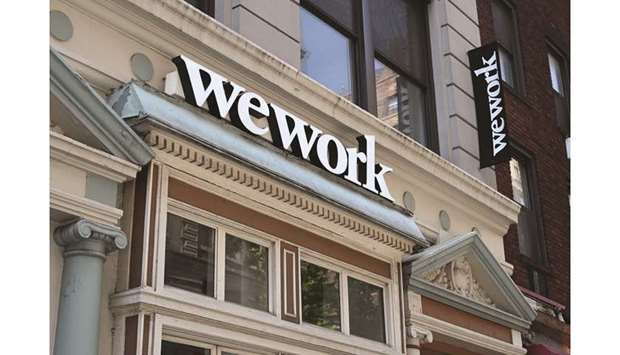WeWork delayed its much-awaited initial public offering as the company seeks more time to overcome investor doubts over its governance, valuation and business prospects.
The offering is likely to be postponed until at least October, people familiar with the matter said on Monday. WeWork had planned to begin making its pitch to investors in a roadshow as soon as this week.
“The We Co is looking forward to our upcoming IPO, which we expect to be completed by the end of the year,” the company said in a statement on Monday evening in New York. “We want to thank all of our employees, members and partners for their ongoing commitment.”
WeWork had faced resistance from bankers and its biggest backer on going through with the offering at sinking valuation levels, and the delay will give advisers more time to drum up interest and may allow the company to show investors another quarter’s worth of results.
Still, the value of WeWork’s bonds sunk the most on record yesterday on concerns that the cash-burning company will miss out not only on the more than $3bn it planned to raise in the offering, but also a $6bn credit facility tied to a successful IPO.
SoftBank Group Corp, the office-rental company’s biggest investor, had pressed WeWork to put off the stock offering amid doubts about the business, people familiar with the matter said previously. In January, SoftBank made its last investment in WeWork, renamed the We Co, at a valuation of $47bn.
The company was more recently expected to be valued at only about $15bn in a listing and perhaps even less, people familiar with the matter have said.
The credit facility requires the company to carry out its IPO by December 31, Bloomberg previously reported.
The company’s $669mn of bonds due in 2025 dropped as much as 7.3 cents on the dollar to 95.5 cents yesterday in New York, according to the Trace bond-price reporting system. That’s the biggest decline since the notes were issued in April 2018.
The biggest backers of SoftBank’s $100bn Vision Fund are now reconsidering how much to commit to its next investment vehicle after the oversized bet on WeWork soured.
Saudi Arabia’s Public Investment Fund, which contributed $45bn to the gargantuan fund, is now only planning to reinvest profits from that vehicle into its successor, according to people familiar with the talks.
Abu Dhabi’s Mubadala Investment Co, which invested $15bn in the Vision Fund, is considering paring its future commitment to below $10bn, the people said, asking not to be identified disclosing internal deliberations.
The delay also adds another sour note to a medley of high-profile but frequently disappointing IPOs this year. The offering was expected to have been the biggest after Uber Technologies Inc’s $8.1bn listing and ahead of Avantor Inc’s $3.3bn IPO and the $2.3bn offering by Uber’s ride-hailing rival Lyft Inc Of those three, only Avantor is trading above its offer price.
WeWork has become an extreme example of the excesses afforded to technology entrepreneurs in the era of unicorns - startups valued at $1bn or more. Adam Neumann, WeWork’s co-founder and chief executive officer, was able to raise billions of dollars at astronomical valuations and spend freely, while retaining effective control over operations through special classes of stock.
In an effort to keep its IPO on track, WeWork last week took steps to limit Neumann’s control of the company after an IPO, as well as other measures to improve its corporate governance.

A WeWork office in New York City. WeWork delayed its much-awaited initial public offering as the company seeks more time to overcome investor doubts over its governance, valuation and business prospects.
